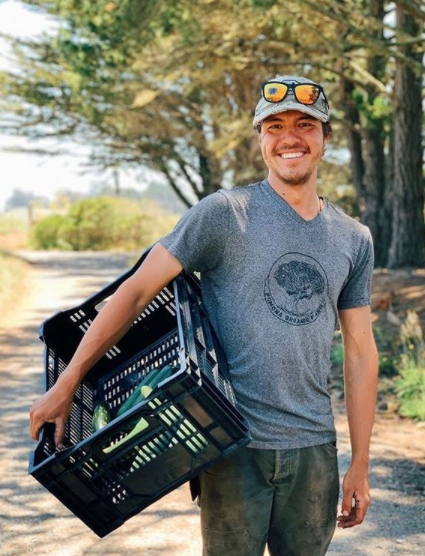By Kelly Franson, Slow Food Youth Network USA
Photos by Scott Chang-Fleeman
““It is a reminder that agriculture has the potential to exist outside of frameworks of capitalism like the commodification of seed.”
– Scott Chang-Fleeman

In honor of Slow Food USA’s recent Slow Seed Summit, let’s talk seeds. What’s happening to them?
It may sound counterintuitive to the idea that food is abundant considering the bountiful piles of shiny apples and perfectly round oranges you’ll find at any modern supermarket, but we are actually losing food – seed varieties to be exact. The seed market is dominated by just three companies – DuPont, Sygenta, and Bayer – who hold more than 60 percent of the market share. Seeds have transformed into intellectual property meant to be patented and sold to farmers who are in turn planting fewer and fewer varieties given that there’s only a few seed providers they can choose from. With the disappearance of heritage varieties, cultures and traditions surrounding these foods start to disappear too.
Thankfully, there are still some farmers who believe in the importance of saving seeds. Scott Chang-Fleeman is the young powerhouse farmer behind Shao Shan Farm in picturesque Marin County, California. He embraces the idea of seed sovereignty every day as he pours his heart and soul into cultivating organic Asian heritage vegetables for local Bay Area restaurants and communities. As an avid seed saver, he kindly shared his thoughts on what it means to practice seed saving and protect seed sovereignty.
Scott saves seeds for a number of reasons, but there is one that resonates the most. “It is a reminder that agriculture has the potential to exist outside of frameworks of capitalism like the commodification of seed.”
Saving seed is not new. In fact, “it’s NOT saving seeds that’s relatively new,” Scott says. He believes that practicing saving seeds is one way to disrupt the idea that seed production is separate from food production. Division of labor might be more efficient, but it’s at the expense of something that can’t be quantified or impact the bottom line – cultural heritage.
Through domestication, seeds have moved with civilizations and people for centuries. This means that different varieties have been passed down from generation to generation and have become integral to cultures and their diaspora. In Scott’s case, he honors his Chinese heritage while staying true to his Californian upbringing by cultivating organic Asian vegetables – including everything from daikon radishes to eggplant to kabocha squash – all of which are cultural markers of Asian cuisine. Today, the majority of farmers who grow these specialty crops are minorities. To put it into perspective, 90% of specialty crops were grown by Japanese pre-Japanese internment period. Now Asian farmers make up less than 1% of American farmers. Scott is paving the way for greater equity and land distribution among communities of color – and it all starts with protecting the seed varieties that are so special to a spectrum of cultures.
“Seed saving gives the farmer the power and ability to create and steward their own seed resources without being reliant on corporations.”

He explains that, “corporations can, and do, drop seed varieties at any time they decide they’re not profitable, regardless of whether or not that variety is important to a community. By saving our own seed it ensures that the foods and varieties we value will exist into the future, and the decisions made about the existence of those varieties are made by the people who care for those seeds.”
Seeds are the precursor to life, and seed sovereignty is the precursor to food sovereignty. When farmers have the right to breed, exchange, and save their own seeds season after season, power is divested from large commercial interests into the hands of the farmer, and by extension into the community that they feed as well as the cultures that they celebrate.
To learn more about Shao Shan Farm and where to find their produce, check out their Instagram.


